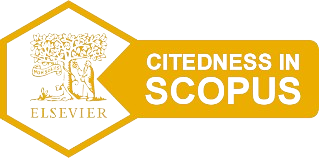Family Engagement in Nurturing Students’ Resilience During Remote Learning in COVID-19 Pandemic
DOI:
https://doi.org/10.15408/tjems.v7i2.20582Keywords:
family engagement, COVID-19 pandemic, remote learning, keterlibatan keluarga, pandemic COVID-19, pembelajaran jarak jauhAbstract
Abstract
This research aims (1) to explore the family's role in remote learning practice and (2) to find out what family can do to nurture students' resilience during the COVID-19 pandemic. This study employed qualitative descriptive methodology with a case study approach to obtain and analyse data narratively. The findings of this study are: (1) Family become the observer of students’ resilience and personality development, their observation will determine teachers’ approach in teaching and educating resilience virtue. Their role as facilitator in home learning shows their support and passion to engage with their children’s learning process. (2) Direct assistance during video conferencing is part of collaboration between school and family to participate in resilience-building, but only few parents did so due to diversed backgrounds.
Abstrak
Penelitian ini bertujuan (1) untuk mengeksplorasi peran keluarga dalam praktik pembelajaran jarak jauh dan (2) untuk mengetahui apa yang dapat dilakukan keluarga untuk memelihara ketahanan siswa selama pandemi COVID-19. Penelitian ini menggunakan metodologi deskriptif kualitatif dengan pendekatan studi kasus untuk memperoleh dan menganalisis data secara naratif. Temuan penelitian ini adalah: (1) Keluarga menjadi pengamat ketahanan dan perkembangan kepribadian siswa, observasi mereka akan menentukan pendekatan guru dalam mengajar dan mendidik ketahanan kebajikan. Peran mereka sebagai fasilitator dalam pembelajaran di rumah menunjukkan dukungan dan semangat mereka untuk terlibat dengan proses pembelajaran anak-anak mereka. (2) Bantuan langsung selama konferensi video merupakan bagian dari kerjasama antara sekolah dan keluarga untuk berpartisipasi dalam pembangunan ketahanan, tetapi hanya sedikit orang tua yang melakukannya karena latar belakang yang berbeda..
How to Cite: Sururin, Mahmuda, M.C., Muslim, M. (2020). Family Engagement in Nurturing Students’ Resilience During Remote Learning in COVID-19 Pandemic. TARBIYA: Journal of Education in Muslim Society, 7(2), 204-216. doi:10.15408/tjems.v7i2.20582.
References
Aji, R. H. (2020). Dampak COVID-19 Pada Pendidikan di Indoensia: Sekolah, Keterampilan dan Proses Pembelajaran. Salam Jurnal Sosial & Budaya Syar-i , 7 (5) , 295-402.
Ali, W. (2020). Online and Remote Learning in Higher Education Institutes: A Necessity in Light of COVID-19 Pandemic. Higher Education Studies Vol 10 no 3 , 16-25.
Asgari, M. (2017). Nurturing Resilience A self-Directed Inquiry Group Guide. Canada: Center for Addictions Research of BC University of Victoria.
Bronfenbrenner, U. (1979). The Ecology of Human Development. USA: The PResident and Fellows of Harvard College.
Bronfenrenner, U. (1986). Ecology of The Family as a Context for Human Development: Research Perspectives. Developmental Psychology , 723-742.
Chambers, D., Scala, J., English, D. (2020). Promising Practices Brief: Improving Student Engagement and Attenfance During COVID-19 School Closures. USA: Insight Policy Research.
Creswell, J. W. (2013). Qualitative Inquiry & Research Design Choosing Among Five Approaches. USA: SAGE.
Emerson, L., Fear. J., Fox, S., Sanders, E. (2012). Parental Engagement in Learning and Schooling: Lessons from Research. Canberra: The Family-School and Community Partneships Bureau.
Ernst, J., Johnson, M., Burcak, F. (2018). The Nature and Nurture of Resilience: Exploring the Impact of Nature Preschools on Young Children's Protective Factors. The International Journal of Early Childhood Environmental Education 6(2), 7-18.
Guest, G., Namey, Emily E., Mitchell, Marilyn L.. (2013). Collecting Qualitative Data A Field Manual for Applied Research. USA: SAGE Publications.
H Luke, H Terri. (2017). Nurturing Childhood Resilience. Journal of Holistic Healthcare 14(1) , 19-24.
Hanover Research. (2011). Distance Education Models and Best Practices. Washington DC: Hanover Research.
Henderson, A. T., Mapp, K. L. (2002). A New Wave of Evidence The Impact of School, Family, and Community Connections on Student Achievement. Texas: National Center for Family and Community Connections with Schools SEDL.
Herdiana, I., Suryanto., Handoyom. S. (2017). Family Resilience: A Conceptual Review. Advances in Social Science, Education and Humanities Research 133 , 42048.
Hill, M, Stafford, A, Seaman, P. Ross, N & Daniel, B. (2007). Parenting and Resilience. York: Joseph Rowntree Foundation.
Krakauer, J. (2017). Early Years Transitions Supporting Children and Families at Risk of Experiencing Vulnerability: Rapid Literature Review. Victoria: Victoria State Government Education and Training.
Leontyeva, I. A. (2018). Modern Distance Learning Technologies in Higher Education: Introducation Problems. EURASIA Journal of Mathematics, Science and Technology Education 14 (10) , 1-8.
Limitations, A. S. (2019). Manijeh Sadeghi. International Journal of Research in English Education (IJREE) 4(1) , 80-88.
Mackay, R. (2003). Family Resilience and Good Child Outcomes: An Overview of The Research Literature. Social Policy Journal of New Zealand Issue 20 , 98-118.
Ministry of Education and Culture. (2020). Surat Edaran No 15 Tahun 2020. Indonesia: Ministry of Education and Culture.
Mohajan, H. K. (2018). Qualitative Research Methodology in Social Sciences and Related Subjects. Hournal of Economic Develpoment, Environment and People 7(1) , 23-48.
Moles, O. C., Fege, A. F. (2011). New Directions for Titlte 1 Family Engagement: Lessons from the Past. In M. M. Sam Redding, Handbook on Family and Community Engagement (pp. 1-14). USA: Academic Development Institute].
Najmi, A. i. (2002). فتح الرب الودود في الفتاوى والرسائل والردود. Dubai: مكتبة الفرقان.
National Education Association. (2012). The Power of Family School Community Partnerships. USA: NEA Human and Civil Rights.
Pasqualotto, R. Angst, Löhr, S.S., Stoltz, T. (2015). Skinner and Vgotsky's Understanding of Resilience in The School Environment. Creative Education 6, 1841-1851.
Public Health England. (2014). Local Auction on Health Inequalities: Building Children and Young People's Resilience in Schools. London:Public Health England.
Redding, S., Murphy, M., Sheley, P. (2011). Handbook on Family and Community Engagement. USA: Academic Development Institute.
Rosa, E.M., Tudge, J. (2013). Urie Bronfenbrenner's Theory of Human Development: Its Evolution From Ecology to Bioegology. Journal of Family Theory & Review , 243-258.
Russel, J. S. (2015). Resilience. Journal of the Philosophy of Sport , 159-183.
Sıla ŞAHİN, Z. B. (2018). Psychological Resilience and Coping Strategies of High Schools Students Based on Certain Variables. Journal of Educational Sciences Research 8(2) , 50-64.
Smith, J., Kuzin, C. A., De Pedro, K. T., Wohlstetter, P. (2009). Family Engagement in Education Seven Principles for Success. USA: National Resource Center on Charter School Finance & Governance.
Syah, M. (2003). Psikologi Belajar. Jakarta: PT Raja Grafindo Persada.
Syakih, A. (2018). Distance Education: Definitions, Generations, Key Concepts and Future Directions. International Journal of Contemporary Educational Research 5(1), 2-17.
Tan-Choi, A., Tinio, V. L., Castillo-Canales, D., Lim, C. P., Modesto, J. G., & Pouezevara, S. R. (2020). Teacher's Guide for Remore Learning during School Closures and Beyond. Phillipines: Faoundation for Information Technology Education and Development Inc.
Ungar, M. (2018). What Works A Manual for Designing Programs that Build Resilience. Canada: The Resilience Research Centre.
Walsh, F. (1996). The Concept of Family Resilience: Crisis and Challenge. Special Section Family Resilience: A Concept and Its Application , 261-281.
Weiss, H. B., Bouffard, S. M., Bridglall, B.L., Gordon, E. W. (2009). Reframing Family Involvement in Education: Suppporting Families to Support Educational Equity. New York: Columbia University.
Winarno., Setiawan, J. (2013). Penerapan Sistem E-Learning pada Komunitas Pendidikan Sekolah Rumah (Home Schooling). ULTIMA InfoSys 4(1) , 45-51.











